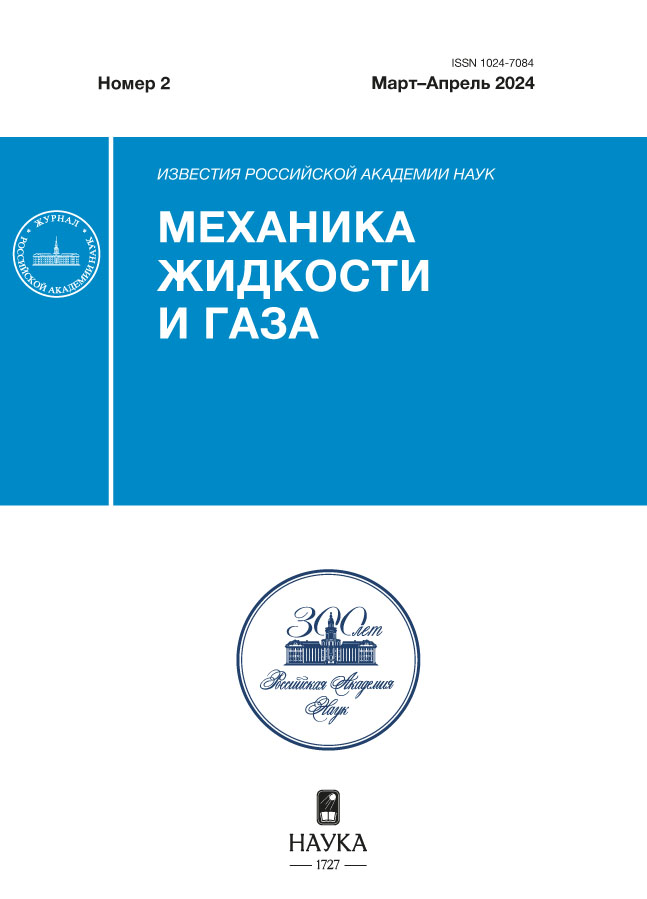Estimate of the onset of laminar-turbulent transition on a plate in flight in the Mars atmosphere
- Авторлар: Grigor’ev Y.N.1, Ershov I.V.1,2
-
Мекемелер:
- Federal Research Center for Information and Computational Technologies
- Novosibirsk State Agrarian University
- Шығарылым: № 2 (2024)
- Беттер: 3-16
- Бөлім: Articles
- URL: https://medjrf.com/1024-7084/article/view/672073
- DOI: https://doi.org/10.31857/S1024708424020015
- EDN: https://elibrary.ru/rjtcmo
- ID: 672073
Дәйексөз келтіру
Аннотация
Comparative calculations of the location of the onset of the laminar-turbulent transition zone are performed using the eN-method for two points on the Mars "Pathfinder" entry trajectory. A three-component model of thermochemically nonequilibrium CO2–CO–O mixture is used in the calculations. The set of spatial disturbance frequencies is found using neutral curves for the first unstable modes of temporary disturbances. The transition Reynolds number ReδT is determined from the envelopes of families of N-factor curves at NT = 8. In the hypersonic regime at M = 12.6, taking into account the developed thermochemical nonequilibrium leads to a significant decrease in the static temperature of gas in the lower part of the boundary layer. As a result, the onset of the laminarturbulent transition zone is displaced downstream by approximately 9% as compared to the case of a perfect gas.
Толық мәтін
Авторлар туралы
Yu. Grigor’ev
Federal Research Center for Information and Computational Technologies
Хат алмасуға жауапты Автор.
Email: grigor@ict.nsc.ru
Ресей, Novosibirsk
I. Ershov
Federal Research Center for Information and Computational Technologies; Novosibirsk State Agrarian University
Email: ivershov1969@gmail.com
Ресей, Novosibirsk; Novosibirsk
Әдебиет тізімі
- Reynier Ph. Survey of aerodynamics and aerothermodynamics efforts carried out in the frame of Mars exploration projects // Prog. Aerosp. Sci. 2014. V. 70. P. 1–27.
- Park Ch., Howe J.T., Jaffe R.L., Candler G.V. Review of chemical-kinetic problems of future NASA missions. II: Mars entries // J. Thermophys. Heat Transf. 1994. V. 8. № 1. P. 9–23.
- Armenise I., Reynie Ph., Kustova E. Advanced models for vibrational and chemical kinetics applied to Mars entry aerothermodynamics // J. Thermophys. Heat Transf. 2016. V. 30. № 4. P. 705–720.
- Candler G.V. Computation of thermo-chemical nonequilibrium Martian atmospheric entry flows // AIAA Paper 90-1695. June 1990. P. 1–10.
- Milos F.S., Chen Y.-K., Congdon W.M., Thomas J.M. Mars Pathfinder entry temperature data, aerothermal, and heatshield material response // AIAA Paper 98-2681. June 1998. P. 1–16.
- Mack L.M. A numerical method for the prediction of high-speed boundary-layer transition using linear theory // Aerodynamic analyses requiring advanced computers. Part I. Washington: NASA, 1975. P. 101–123.
- Бойко А.В., Демьянко К.В., Нечепуренко Ю.М. О расчете положения ламинарно-турбулентного перехода в пограничных слоях с учетом сжимаемости. Препринт № 81. М.: ИПМ им. М.В. Келдыша РАН. 2015. 21 с.
- Kustova E.V., Nagnibeda E.A. On correct description of a multi-temperature dissociating CO2 flow // Chem. Phys. 2006. V. 321. P. 293–310.
- Лойцянский Л.Г. Механика жидкости и газа. М.-Л.: ГИТТЛ, 1950. 676 с.
- Краткий справочник физико-химических величин. Справочник / Под ред. К.П. Мищенко, А.А. Равделя. Л.: Химия, 1974. 200 с.
- Wilke C.R. A viscosity equation for gas mixtures // J. Chem. Phys. 1950. V. 18. P. 517–519.
- Blottner F.G., Johnson M., Ellis M. Chemically reacting viscous flow program for multicomponent gas mixtures. Research Report SC-RR-70-754. Albuquerque: Sandia Laboratories. 1971. 320 p.
- Grigoryev Yu.N., Ershov I.V. Stability and suppression of turbulence in relaxing molecular gas flows. Cham: Springer Intern. Publishing, 2017. 233 p.
- Franko K.J., MacCormack R.W., Lele S.K. Effects of chemistry modeling on hypersonic boundary layer linear stability prediction // AIAA Paper 2010–4601. June–July 2010. P. 1–13.
- Armenise I., Kustova E. On different contributions to the heat flux and diffusion in non-equilibrium flows // Chem. Phys. 2014. V. 428. P. 90–104.
- Rock S.G., Candler G.V., Hornung H.G. Analysis of thermochemical nonequilibrium models for carbon dioxide flows // AIAA Journal. 1993. V. 31. P. 2255–2262.
- Camac M. CO2 relaxation processes in shock waves // Fundamental phenomena in hypersonic flow. Ithaca, New York: Cornell Univ. Press, 1966. P. 195–215.
- Park Ch., Howe J.T., Jaffe R.L., Candler G.V. Chemical-kinetic problems of future NASA missions // AIAA Paper 91-0464, January 1991. P. 1–31.
- Григорьев Ю.Н., Ершов И.В. Влияние колебательного возбуждения газа на положение зоны ламинарно-турбулентного перехода на пластине // ПМТФ. 2021. Т. 62. № 1. С. 14–21.
- Gaster M. A note on the relation between temporally-increasing and spatially-increasing disturbances in hydrodynamic stability // J. Fluid Mech. 1962. V. 14. P. 222–224.
- Trefethen L.N. Spectral methods in Matlab. Philadelphia: Society for Industrial and Applied Mathematics, 2000. 160 p.
- Mack L.M. Boundary layer stability theory. Preprint of JPL Technical Report, Document 900–277. Rev. A. Pasadena: California Institute of Technology, 1969. 272 p.
- Григорьев Ю.Н., Ершов И.В. Линейная устойчивость сверхзвукового пограничного слоя релаксирующего газа на пластине // Изв. РАН. МЖГ. 2019. № 3. С. 3–15.
- Mack L.M. Linear stability theory and problem of supersonic boundary-layer transition // AIAA Journal. 1974. V. 13. P. 278–289.
Қосымша файлдар












